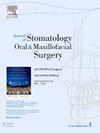Augmented reality in implantology: Virtual surgical checklist and augmented implant placement
IF 1.8
3区 医学
Q2 DENTISTRY, ORAL SURGERY & MEDICINE
Journal of Stomatology Oral and Maxillofacial Surgery
Pub Date : 2024-10-01
DOI:10.1016/j.jormas.2024.101813
引用次数: 0
Abstract
Objectives
Aim of the present study was to create a pedagogical checklist for implant surgical protocol with an augmented reality (AR) guided freehand surgery to inexperienced surgeons using a head mounted display (HMD) with tracking.
Methods
The anatomical model of a patient with two missing mandibular teeth requiring conventional single-tooth implants was selected. The computed tomography (CT) scans were extracted and imported into segmentation and implant planning software. A Patient-specific dental splint through an intermediate strut, supported 3D-printed QR code. A checklist was generated to guide surgical procedure. After tracking, the AR-HMD projects the virtual pre-surgical plan (inferior alveolar nerve (IAN), implant axis, implant location) onto the real 3D-printed anatomical models. The entire drilling sequence was based on the manufacturer's recommendations, on 3D-printed anatomical models. After the implant surgical procedure, CT of the 3D-printed models was performed to compare the actual and simulated implant placements. All procedures in the study were performed in accordance with the Declaration of Helsinki.
Results
In total, two implants were placed in a 3D-printed anatomical model of a female patient who required implant rehabilitation for dental agenesis at the second mandibular premolar positions (#35 and #45). Superimposition of the actual and simulated implants showed high concordance between them.
Conclusion
AR in education offers crucial surgical information for novice surgeons in real time. However, the benefits provided by AR in clinical and educational implantology must be demonstrated in other studies involving a larger number of patients, surgeons and apprentices.
植入学中的增强现实技术:虚拟手术清单和增强植入物植入。
目的:本研究的目的是通过使用带有跟踪功能的头戴式显示器(HMD),为缺乏经验的外科医生创建一份由增强现实(AR)引导的徒手种植手术教学清单:方法:选取了一名下颌两颗牙齿缺失、需要进行传统单牙种植的患者的解剖模型。提取计算机断层扫描(CT)扫描结果并导入分割和种植规划软件。通过中间支柱制作了患者专用的牙科夹板,支持 3D 打印 QR 代码。生成的检查表可指导手术过程。跟踪后,AR-HMD 将虚拟手术前计划(下牙槽神经 (IAN)、种植体轴线、种植体位置)投射到真实的 3D 打印解剖模型上。整个钻孔过程都是根据制造商的建议在 3D 打印的解剖模型上进行的。种植手术结束后,对 3D 打印模型进行 CT 扫描,以比较实际和模拟的种植位置。研究中的所有程序均按照《赫尔辛基宣言》进行:一名女性患者因牙齿缺失需要在第二下颌前磨牙位置(35 号和 45 号)进行种植修复,在该患者的三维打印解剖模型中总共植入了两颗种植体。实际种植体与模拟种植体的叠加显示两者之间高度一致:AR教育为外科医生新手提供了重要的实时手术信息。然而,AR 在临床和教育种植学方面的优势必须在其他涉及更多患者、外科医生和学徒的研究中得到证实。
本文章由计算机程序翻译,如有差异,请以英文原文为准。
求助全文
约1分钟内获得全文
求助全文
来源期刊

Journal of Stomatology Oral and Maxillofacial Surgery
Surgery, Dentistry, Oral Surgery and Medicine, Otorhinolaryngology and Facial Plastic Surgery
CiteScore
2.30
自引率
9.10%
发文量
0
审稿时长
23 days
 求助内容:
求助内容: 应助结果提醒方式:
应助结果提醒方式:


